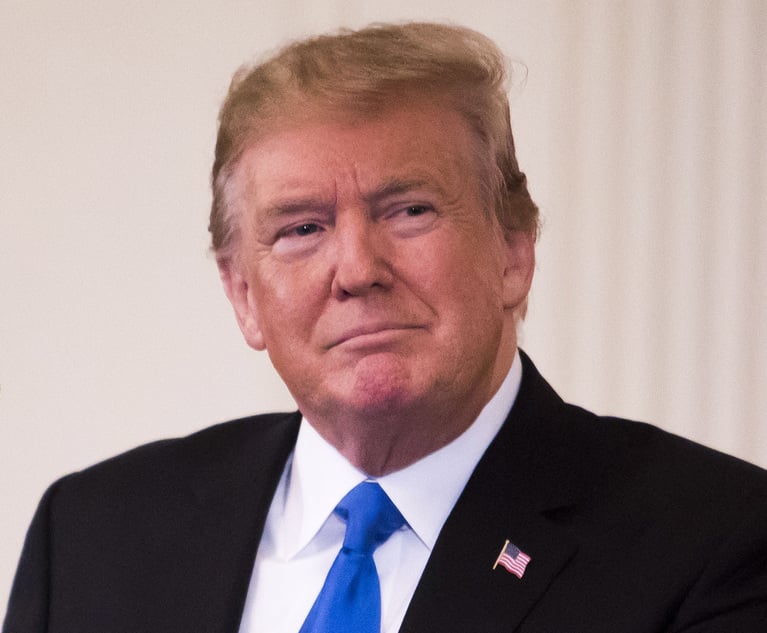CBD Use in Consumer Products Under the Farm Bill and NJ Law
The lack of guidance at a federal level represents a situation whereby businesses in the cannabis industry should proceed with caution.
June 19, 2019 at 02:00 PM
7 minute read
 Credit: Jonathan Weiss/Shutterstock.com
Credit: Jonathan Weiss/Shutterstock.com
Industrial hemp has a long and rich history throughout the world. This is largely because hemp is dynamic and can evolve into products such as clothing, animal feed, building materials, bio plastics, biofuels, paper, fiber and food. Hemp seeds, or grains, are smooth and about one-eighth to one-fourth of an inch long. Hemp seeds can also be used to make a variety of products for industrial and cosmetic use. Of particular interest in New Jersey are the agricultural benefits associated with the hemp plant. Hemp has been known to kill weeds, thereby negating the need for herbicides on crops. Hemp also can absorb metals in the soil thereby acting as a natural filter, mitigating sediment runoff, through which eroded soils carry nutrient pollution into water resources.
Given its multipurpose capabilities, it is no surprise that Congress passed the Agriculture Improvement Act of 2018 ("Farm Bill"). Section 297A of the Farm Bill defines hemp as "the plant Cannabis sativa L. and any part of that plant, including the seeds thereof and all derivatives, extracts, cannabinoids, isomers, acids, salts, and salts of isomers, whether growing or not, with a delta-9 tetrahydrocannabinol [THC] concentration of not more than 0.3 percent on a dry weight basis." The Farm Bill effectively decriminalizes hemp by removing it from the Controlled Substances Act. The Farm Bill also expands the commercial cultivation of hemp beyond the limited state-approved pilot programs, legalizes hemp production in US territories and on Indian tribal land, and authorizes the coverage of hemp as a commodity under crop insurance.
Because hemp is no longer viewed as a controlled substance, the Drug Enforcement Agency has been removed from oversight and replaced with United States Department of Agriculture (USDA). As such, the USDA exercises primary regulatory authority over hemp production. According to the New Jersey Department of Agriculture (NJDOA), the USDA intends to issue regulations in the fall of 2019 for states that wish to submit hemp production plans. These regulations will address requirements for testing the THC levels of hemp and address disposal of hemp plants and products produced that contain more than .3% THC.
The Farm Bill also allows transfer of hemp derived products across state lines for commercial or other purposes. It does not place any restrictions on the sale, transport or possession of hemp-derived products, so long as those items are produced in a manner consistent with the law. In passing the Farm Bill, Congress legalized hemp production for all purposes within the parameters of the statute, but granted States and Indian Tribes the authority to enact and enforce more stringent laws regulating the production of hemp. Because the Farm Bill provides states with the authority of enforcing hemp production, it is important we consider New Jersey law as it relates to the Farm Bill.
In November of 2018 Governor Phil Murphy signed a bill to begin a pilot program for New Jersey farmers to produce industrial hemp. The pilot program calls for rules to ensure that growers are not subject to criminal penalties and meet federal guidelines and legal growing limits, and allows for collaboration with higher education institutions. The NJDOA is required to adopt rules and regulations to administer the pilot program. These include creating requirements for the licensing or contracting of growers participating in the program, prescribing hemp testing procedures to ensure compliance with federal law, creating a fee structure for the administration of the program, and certifying germinating seeds and hemp cultivars if necessary.
The NJDOA is currently in the process of developing regulations for New Jersey's Industrial Hemp Pilot Program. As of May 2019, New Jersey lawmakers proposed the New Jersey Hemp Farming Act (NJHFA), [A5322] which would repeal New Jersey's Industrial Hemp Pilot Program and replace it with a more permanent program, administered by the Department of Agriculture. The legislation would make it lawful for hemp producers to cultivate, handle or process hemp in the state, and for any person to possess, transport, sell and purchase legally produced hemp products. Under the proposed legislation, any person or entity that is not a hemp producer or an agent of a hemp producer, but who cultivates, handles or processes living hemp plants or viable seeds, leaf materials or floral materials derived from hemp, shall be subject to the same penalties as those related to marijuana.
Under proposed Assembly Bill 5322, the term "hemp" includes hemp-derived cannabinoids, including cannabidiol, shall be considered an agricultural commodity and not a controlled substance. Derivatives of hemp, including hemp-derived cannabidiol, may be added to cosmetics, personal care products, and products intended for human or animal consumption to the maximum extent permitted by federal law. All of these products, so long as they are legally sourced, shall not be considered controlled substances and may be legally transported across state lines and exported to foreign countries in a manner that is consistent with federal law and the laws of respective foreign countries.
However, when it comes to edible items containing CBD the Farm Bill expressly preserved the Food and Drug Administration's (FDA) authority to regulate products containing cannabis or cannabis-derived compounds under the Federal Food, Drug, and Cosmetic Act (FD&C Act) and the Public Health Service Act. As such, if a hemp product is intended for use as a drug, food (including dietary supplement), device or cosmetic by humans or animals and is introduced into interstate commerce, the product is subject to FDA regulation regardless of its source. This is because the FDA is responsible for ensuring public health and safety through regulation of food, drugs, supplements and cosmetics, among other consumable products, through its enforcement authority pursuant to the FD&C Act.
Under the FD&C Act the FDA has concluded that it is a prohibited act to introduce or deliver for introduction into interstate commerce any food (including any animal food or feed) to which THC or CBD has been added. The FDA has made clear that products containing hulled hemp seed, hemp seed protein, and hemp seed oil can be legally marketed in human or pet foods without food additive approval—provided they comply with all other regulations and do not make any disease treatment claims.
Federal law aside, many state health agencies have adopted policies and regulations prohibiting CBD and other non-FDA-approved cannabinoids in food products. For example, Colorado and Alaska permit industrial hemp in food, while states like New York and Maine have expressly prohibited the same. In New Jersey, the Department of Health has not yet adopted any policies and/or regulations prohibiting the incorporation of hemp derived CBD and other non-FDA-approved cannabinoids in food products. Therefore, it appears that New Jersey will not take action with respect to incorporating hemp derived CBD in food, at least until the Department of Health issues regulations stating otherwise, or the FDA instructs the state to act otherwise. It is important to note that the commodity must contain lawfully sourced hemp products.
In sum, products such as lotions, cosmetics and clothing containing CBD derived from lawfully sourced hemp can be transported across state lines and exported to foreign countries in a manner that is consistent with federal law and the laws of respective foreign countries. Some retailers and manufacturers are waiting for the DOA and FDA to provide more guidance before they go forward with marketing CBD products, while others are moving full steam ahead with commercializing hemp derived CBD products absent clear guidelines. The lack of guidance at a federal level represents a situation whereby businesses in the cannabis industry should proceed with caution. While enforcement by the FDA has been sporadic, it does not mean that it is unlikely.
Nicole A. Maguire is a member of the Food, Beverage and Agribusiness Group at Lindabury, McCormick, Estabrook & Cooper in Westfield.
This content has been archived. It is available through our partners, LexisNexis® and Bloomberg Law.
To view this content, please continue to their sites.
Not a Lexis Subscriber?
Subscribe Now
Not a Bloomberg Law Subscriber?
Subscribe Now
NOT FOR REPRINT
© 2025 ALM Global, LLC, All Rights Reserved. Request academic re-use from www.copyright.com. All other uses, submit a request to [email protected]. For more information visit Asset & Logo Licensing.
You Might Like
View All
3rd Circuit Strikes Down NLRB’s Monetary Remedies for Fired Starbucks Workers


As Trafficking, Hate Crimes Rise in NJ, State's Federal Delegation Must Weigh in On New UN Proposal
4 minute read
Trending Stories
Who Got The Work
J. Brugh Lower of Gibbons has entered an appearance for industrial equipment supplier Devco Corporation in a pending trademark infringement lawsuit. The suit, accusing the defendant of selling knock-off Graco products, was filed Dec. 18 in New Jersey District Court by Rivkin Radler on behalf of Graco Inc. and Graco Minnesota. The case, assigned to U.S. District Judge Zahid N. Quraishi, is 3:24-cv-11294, Graco Inc. et al v. Devco Corporation.
Who Got The Work
Rebecca Maller-Stein and Kent A. Yalowitz of Arnold & Porter Kaye Scholer have entered their appearances for Hanaco Venture Capital and its executives, Lior Prosor and David Frankel, in a pending securities lawsuit. The action, filed on Dec. 24 in New York Southern District Court by Zell, Aron & Co. on behalf of Goldeneye Advisors, accuses the defendants of negligently and fraudulently managing the plaintiff's $1 million investment. The case, assigned to U.S. District Judge Vernon S. Broderick, is 1:24-cv-09918, Goldeneye Advisors, LLC v. Hanaco Venture Capital, Ltd. et al.
Who Got The Work
Attorneys from A&O Shearman has stepped in as defense counsel for Toronto-Dominion Bank and other defendants in a pending securities class action. The suit, filed Dec. 11 in New York Southern District Court by Bleichmar Fonti & Auld, accuses the defendants of concealing the bank's 'pervasive' deficiencies in regards to its compliance with the Bank Secrecy Act and the quality of its anti-money laundering controls. The case, assigned to U.S. District Judge Arun Subramanian, is 1:24-cv-09445, Gonzalez v. The Toronto-Dominion Bank et al.
Who Got The Work
Crown Castle International, a Pennsylvania company providing shared communications infrastructure, has turned to Luke D. Wolf of Gordon Rees Scully Mansukhani to fend off a pending breach-of-contract lawsuit. The court action, filed Nov. 25 in Michigan Eastern District Court by Hooper Hathaway PC on behalf of The Town Residences LLC, accuses Crown Castle of failing to transfer approximately $30,000 in utility payments from T-Mobile in breach of a roof-top lease and assignment agreement. The case, assigned to U.S. District Judge Susan K. Declercq, is 2:24-cv-13131, The Town Residences LLC v. T-Mobile US, Inc. et al.
Who Got The Work
Wilfred P. Coronato and Daniel M. Schwartz of McCarter & English have stepped in as defense counsel to Electrolux Home Products Inc. in a pending product liability lawsuit. The court action, filed Nov. 26 in New York Eastern District Court by Poulos Lopiccolo PC and Nagel Rice LLP on behalf of David Stern, alleges that the defendant's refrigerators’ drawers and shelving repeatedly break and fall apart within months after purchase. The case, assigned to U.S. District Judge Joan M. Azrack, is 2:24-cv-08204, Stern v. Electrolux Home Products, Inc.
Featured Firms
Law Offices of Gary Martin Hays & Associates, P.C.
(470) 294-1674
Law Offices of Mark E. Salomone
(857) 444-6468
Smith & Hassler
(713) 739-1250






